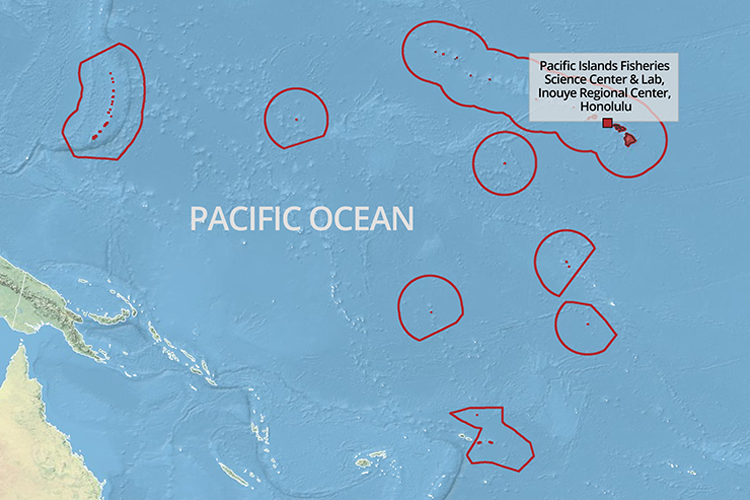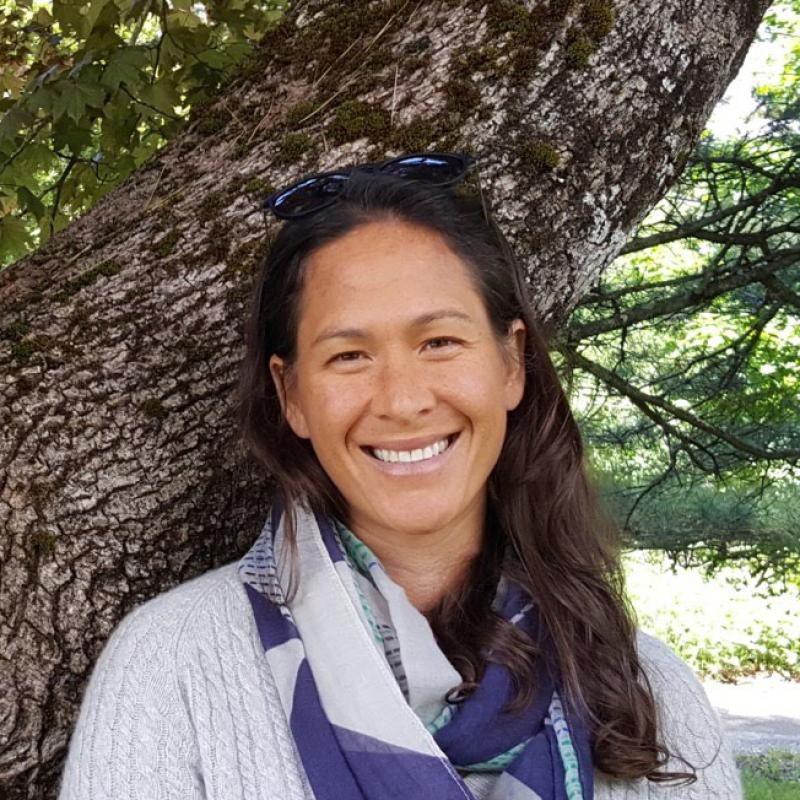Our Location

Bounded by the Hawaiian Archipelago in the north, American Samoa and U.S. Pacific Remote Island Areas in the south, and the Mariana Archipelago in the west, the Pacific Islands region encompasses the largest geographical area within NOAA Fisheries’ jurisdiction. The U.S. Exclusive Economic Zone (EEZ) within the region includes more than 1.7 million square nautical miles of ocean, roughly equal to the total EEZ of the continental United States and Alaska. We also research living marine resources in the high-seas areas of the central and western Pacific.
What We Do
The center's work includes these main focus areas:
Ecosystem Sciences
We conduct multidisciplinary research, monitoring, and analysis of integrated environmental and living resource systems in coastal and offshore waters of the Pacific Ocean.
- Field research activities cover near-shore island ecosystems such as coral reefs to open ocean ecosystems on the high seas.
- Research focus includes: oceanography, coral reef ecosystem assessment and monitoring, benthic habitat mapping, and marine debris surveys and removal.
- Analysis of the current structure and dynamics of marine environments, as well as examination of potential projections of future conditions such as those resulting from climate change impacts are assessed with use of numerical ecosystem models.
- Because humans are a key part of the ecosystem, our research includes the social, cultural, and economic aspects of fishery and resource management decisions.
Learn more about ecosystem sciences in the Pacific Islands
Fisheries Research and Monitoring
We coordinate the Center's programs for fisheries monitoring, fisheries data management, fisheries interactions, fish life history studies, and stock assessment.
- We provide the scientific foundation to enable informed and effective implementation of ecosystem-based management and conservation strategies for U.S. fisheries throughout the Pacific Islands region.
- We carry out extensive activities to monitor U.S. fisheries of the Pacific Islands and oceanic waters of the central and western Pacific, assess the status of exploited fish stocks, and provide scientific advice to fishery managers. These activities are guided by mandates and authorities derived primarily from the Magnuson-Stevens Fishery Conservation and Management Act and international agreements.
- We also work closely with our partners in state and other federal agencies and local governments, international fisheries organizations, foreign scientific institutions, the fishing and seafood industry, academia, and non-governmental organizations.
Learn more about fisheries research and monitoring in the Pacific Islands
Protected Species
We provide the scientific foundation for the conservation of cetaceans, Hawaiian monk seals, and sea turtles in the Pacific Islands, guided by mandates of the Marine Mammal Protection Act, Endangered Species Act, and international agreements.
- Cetacean Research Program conducts research needed for the assessment of whale and dolphin populations in the central and western Pacific Ocean, which requires an understanding of distribution, stock structure, habitat use, and natural and anthropogenic threats, along with estimates of abundance, demography, and mortality.
- Hawaiian Monk Seal Research Program conducts science-based conservation. The program carries out research and monitoring to support identification of threats, and designs, implements and evaluates interventions to mitigate those threats.
- Marine Turtle Biology and Assessment Program conducts research throughout the central and western Pacific Ocean to support the conservation and management of threatened and endangered marine turtle populations. The program works to understand the distribution, abundance, trends, movements, habitat use, and population dynamics of numerous populations of turtles from five species, as well as the impacts of anthropogenic activities such as fisheries bycatch on each population.
Learn more about protected species research in the Pacific Islands
Operations, Management, and Information
We provide high quality customer service, oversight, and the technical tools necessary to help further the success of the PIFSC and NOAA mission, while ensuring compliance with agency policies and regulations.
- Administrative Services provides oversight and coordination in the areas of personnel, procurement, travel, training, property management, grants management, interagency agreements, facilities and maintenance, safety and environmental compliance, and other related areas.
- Budget Office staff coordinate the development of budgets to meet Center objectives; operate an effective financial management system to allocate, monitor and account for Center monetary resources; and regularly report to Division Chiefs and the Center Director on financial status.
- Information Technology Services provides the infrastructure and tools needed by all Center employees to complete their job while enforcing the mandated security requirements.
Our Leadership

Charles Littnan, Ph.D.
Director
Dr. Charles Littnan is the Director of the Pacific Islands Fisheries Science Center. In his role, Dr. Littnan focuses on the center’s mission to provide science to support the conservation and management of fisheries and living marine resources across the Pacific Ocean. Dr. Littnan is a marine biologist with 20 years’ experience including research to support the conservation and management of large, complex, research programs related to marine mammals and sea turtles.

Tia P. Brown
Deputy Director
Tia is the Deputy Director of the Pacific Islands Fisheries Science Center. In her role, Ms. Brown provides the operational and administrative guidance and oversight of the science, operations, and administrative activities that support stewardship of living marine resources in the vast expanse of the Pacific Islands region. Ms. Brown has led a broad range of management and policy activities across NOAA.
Management Team
Director's Office
Charles Littnan, Ph.D.
DirectorTia P. Brown
Deputy Director-
-
Communications and Policy
Ariel Jacobs, Supervisory Program Analysis Officer
-
Communications and Policy
Operations, Management, and Information Division
Stuart Merrill
Division Director-
-
Procurement, Grants, and Agreements
Stephanie Garnett, Supervisory Business and Industry Specialist
-
Procurement, Grants, and Agreements
-
-
Budget Office
Mary Zadlo, Budget Officer
-
Budget Office
-
-
Information Technology Services
Derek Turqueza, Division Chief, ITS
-
Information Technology Services
-
-
Survey and Operations Support Program
Garry Harsanyi, Supervisory Natural Resource Management Specialist
-
Survey and Operations Support Program
-
-
Science Support Services
Kevin Wong, PhD, Supervisory Industrial Engineer
-
Science Support Services
Ecosystem Sciences Division
Frank Parrish, PhD
Division Director-
-
Social-Ecological and Economic Systems Program
Justin Hospital, Supervisory Economist
-
Social-Ecological and Economic Systems Program
-
-
Pelagic Research Program
Ryan Rykaczewski, PhD, Supervisory Research Marine Scientist
-
Pelagic Research Program
-
-
Archipelagic Research Program
Jennifer Samson, PhD, Supervisory Research Ecologist
-
Archipelagic Research Program
Fisheries Research and Monitoring Division
T. Todd Jones, PhD
Division Director-
-
Fisheries Reporting and Bycatch Program
Keith Bigelow, Supervisory Research Fish Biologist
-
Fisheries Reporting and Bycatch Program
-
-
Stock Assessment Program
Felipe Carvalho, PhD, Supervisory Research Mathematical Statistician
-
Stock Assessment Program
-
-
Life History Program
Eva Schemmel, PhD, Supervisory Fish Biologist
-
Life History Program
-
-
Fisheries Monitoring Program
Jenny Suter, Supervisory Fishery Management Specialist
-
Fisheries Monitoring Program
Protected Species Division
Erin Oleson, PhD
Supervisory Research Ecologist-
-
Marine Turtle Biology and Assessment Program
Summer L. Martin, PhD, Supervisory Research Biologist
-
Marine Turtle Biology and Assessment Program
-
-
Hawaiian Monk Seal Research Program
Michelle Barbieri, DVM, MS, Supervisory Veterinary Medical Officer
-
Hawaiian Monk Seal Research Program
-
-
PSD Services and Support Program
Jessica Bohlander, Supervisory Marine Biologist
-
PSD Services and Support Program